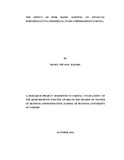| dc.description.abstract | Recent public interest in the management of resources in the public sector has
reignited the need for risk based auditing. A risk based audit approach is designed to
be used throughout the audit to efficiently and effectively focus the nature, timing and
extent of audit procedures to those areas that have the most potential for causing
material misstatements in the financial report (Institute of Chartered Accountants of
Australia, 2011). According to Bell et al (2005) the basic premise of RBA is that
auditors should devote more resources to accounts that are likely to be misstated and
fewer resources to those that are less likely to be misstated thereby improving
financial performance. The study sought to establish the effect of risk based audit on
the financial performance of the commercial state corporations in Kenya. This
research was conducted through a descriptive survey research design. The descriptive
survey research design was considered appropriate as it enables description of the
characteristics of certain groups, estimation of the proportion of people who have
certain characteristics and making of predictions. This study used primary and
secondary data. The primary data was obtained from the Chief Internal Auditors of
the sampled firms while the secondary data was obtained from the annual financial
reports of the sampled state corporations in Kenya over a period of 3 years (20112013).
The data was collected based on the information about the variables.
Quantitative data was analyzed by descriptive analysis while qualitative data was
analyzed through content analysis. The study may provide information to policy
makers, scholars, academicians and investors on the effect of RBA on the financial
performance of public sector in Kenya. From the findings, the study established that
risk management, annual risk based audit planning, internal auditing standards and
internal auditing capacity significantly affected the financial performance of the state
corporations in Kenya over the 3 year period to a great extent. The study concludes
that there exists a positive relationship between risk based audit factors and the
financial performance of the state corporations in Kenya. The study recommends that
the management of the state corporations in Kenya should embrace the ISAs to guide
the ethical work of internal auditors, enhance risk management practices and support
the internal audit function by providing the necessary resources and fully
implementing its recommendations. | en_US |

